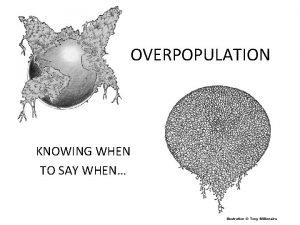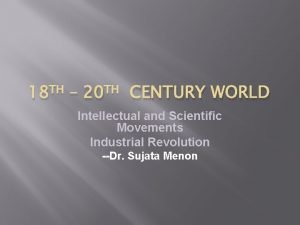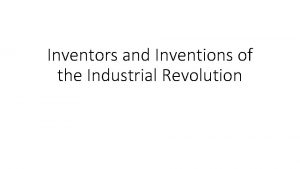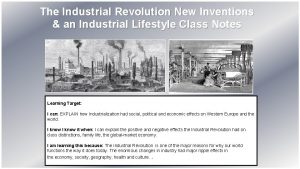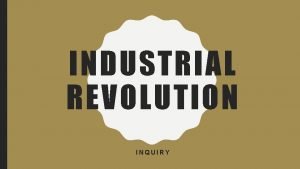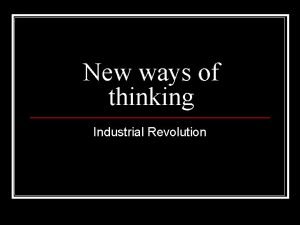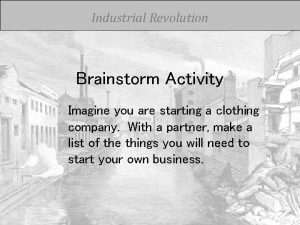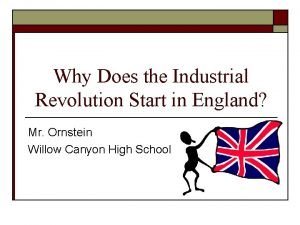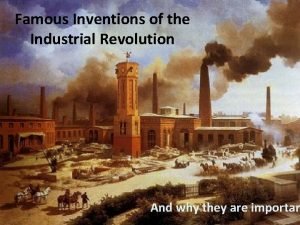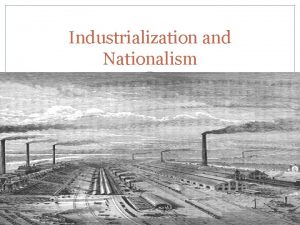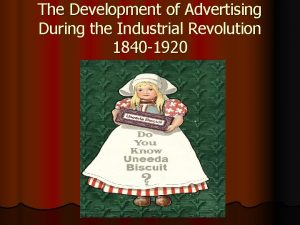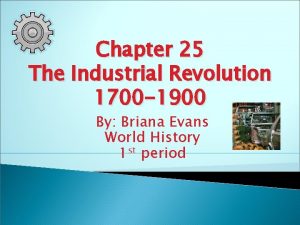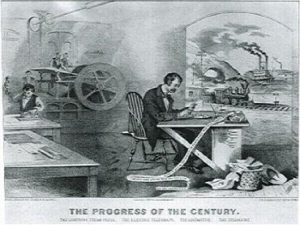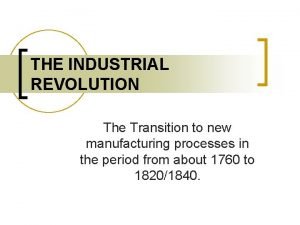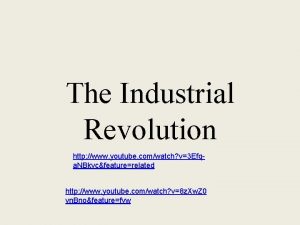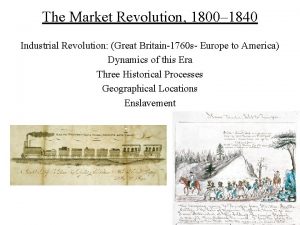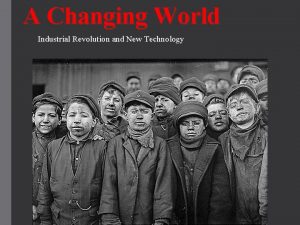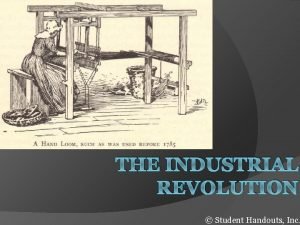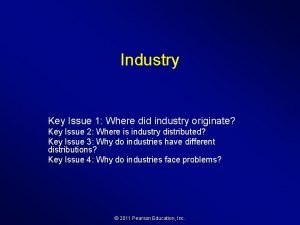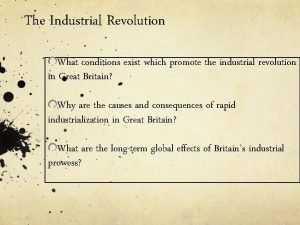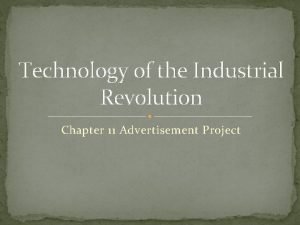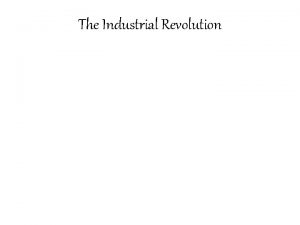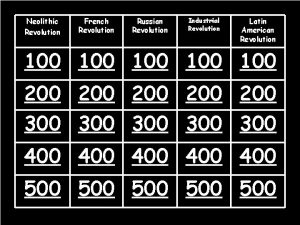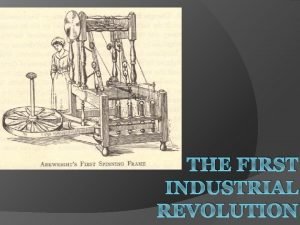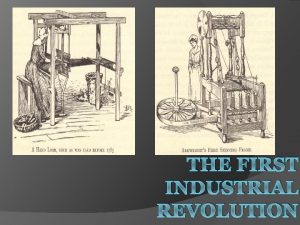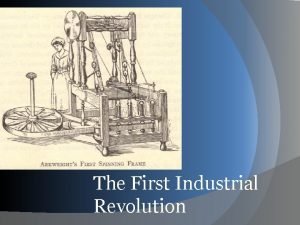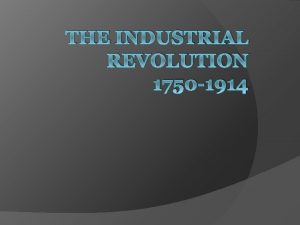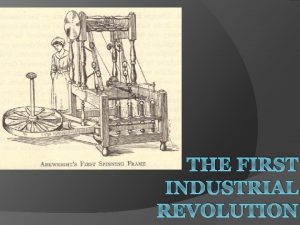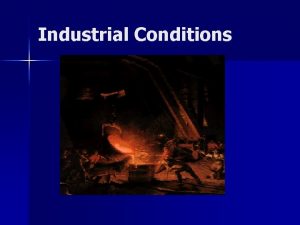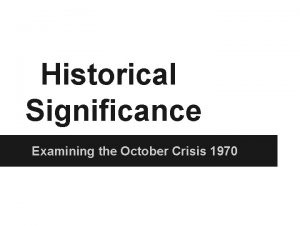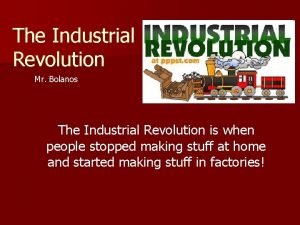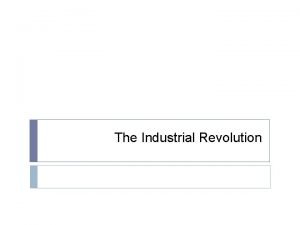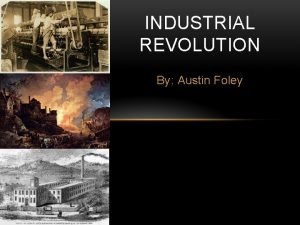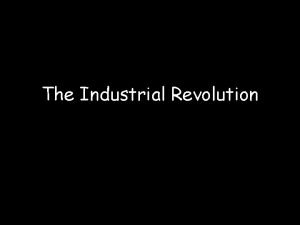THE INDUSTRIAL REVOLUTION Historical Significance of the Industrial



































- Slides: 35

THE INDUSTRIAL REVOLUTION

Historical Significance of the Industrial Revolution An ancient Greek or Roman would have been just as comfortable in Europe in 1700 because daily life was not much different – agriculture and technology were not much changed in 2000+ years ® The Industrial Revolution changed human life drastically ® More was created in the last 250+ years than in the previous 2500+ years of known human history ®

Industrialism Begins ® Industrialism New economic system ® Rely on machinery rather than animal and human power ® ® Before industrialism most people lived in small farming villages ® Cottage industries ® Began ® in the “textile” industry Woven cloth

Industrialism Begins ® Industrial Revolution Begins in Britain ® ® New Ways of Working ® ® Begins in the mid 1700 s The IR greatly increases out-put of machine made goods The Agricultural Revolution Paves the Way ® ® ® Enclosures – large farm fields enclosed by fences Wealthy landowners buy & enclose land once owned by village farmers Enclosures allow experimentation with new agricultural methods

The Beginnings of Industrialization ® Rotating Crops Crop rotation – switching crops each year to avoid soil depletion ® Selective Breeding – Livestock breeders allow only the best to breed, improve the food supply ®

Why did the IR begin in Britain? ® Britain had all of the factors ® Land, labor, and capital ® Britain had the necessary ® Coal, iron, rivers, harbors of production natural resources ® Expanding economy encouraged development ® Developed banking system, overseas trade (with colonies), economic prosperity ® Political stability

Inventions Spur Industrialization ® Changes ® Flying in the Textile Industry Shuttle (1733) John Kay ® Doubled the work a weaver could do in a day ®

Inventions Spur Industrialization ® Spinning Jenny (1764) James Hargreaves ® One spinner could work eight thread at a time ®

Inventions Spur Industrialization ® Water Frame (1769) Richard Arkwright ® Machines could now be powered by water, not just hand ®

Inventions Spur Industrialization ® Power Loom (1787) Edmund Cartwright ® Sped up the weaving process ®

Inventions Spur Industrialization ® Changes in the Textile Industry ® Cotton Gin (1793) ® ® Eli Whitney Multiplied the amount of cotton produced Result: l 1760: Britain Imports 2. 5 million pounds of raw cotton; mostly processed by hand in cottage system l 1787: Britain Imports 22 million pounds of raw cotton; mostly processed by machines and water power l 1840: Britain Imports 366 million tons; mostly processed in factories by steam power ® Development of Factories ® ® Buildings that contain machinery for manufacturing First factories needed to be near rivers for water power

Necessity is the Mother of Invention ® The process of inventing never ends, one invention inevitably leads to improvements upon it and to more inventions

The First Factories

Improvements in Transportation ® Steam ® Need for cheap, convenient power ® ® Engine Steam becomes important source of energy James Watt improves the steam engine ® Water Transportation First steamboat “Clermont” ® Robert Fulton in 1807 ® ® Road Transportation British roads are improved ® Companies operate toll roads ® Beginning of the railroad ®

Significance of the Steam Engine ® Requires a specialized facility for its use near a ready source of coal ® Coal mining ® Changed the location of factories, freeing the factory to be located in the most economical location

The Railway Age Begins ® Railroads Revolutionize Life ® The Railroad System ® Spurs industrial growth ® Creates jobs ® Provides cheaper transportation ® Boosts many industries: agriculture, fishing ® Causes people to move to cities

The Railway Age Begins ® First Railroad Line ® George Stephenson (1825) ® Liverpool-Manchester Line (1829) ® Used Stephenson’s “Rocket” ® World’s first locomotive ® http: //www. bbc. co. uk/history/british/victorians/launch_ani_rocket. shtml

The Impact of the Railroad

Industrialization ® Factory Work ® ® Changes Life Pays more than farms Spurs the demand for more expensive goods ® Rise of Industrial Cities ® Urbanization – movement of people to city ® Population growth provides work force, markets for goods ® Major cities: London, Manchester, Liverpool, Birmingham


The Working Class ® Living Conditions ® Rapid Urbanization caused: ® Cities without adequate housing, education, and police protection ® Urban slums ® Disease and sickness spread quickly ® Life span is only 17 years ® Lack of sanitary & building codes


The Working Class ® Working Conditions ® Average workday – 14 -16 hours ® 6 days a week, year round ® Dirty, poorly lit factories ® Mind-numbing monotony ® Numerous injuries and death ® No health insurance ® No labor laws ® Eventually replaced by machines ® Huge population means large unemployment

The Life of the New Urban Poor: A Dickensian Nightmare!

The Rise of the Middle Class ® The Middle Class ® Factories helped to create a new group of people – the middle class Skilled workers, merchants, rich farmers, managers, and professionals ® Had a comfortable standard of living ® ® Looked down upon by aristocrats and landowners

Positive Effects of the Industrial Revolution ® Immediate Benefits Creates jobs ® Enriches nation ® Encourages technological progress ® Education expands ® Cheaper goods, including clothing ® ® Long Term Effects Improved standard of living ® Improved working conditions ® Increase in taxes lead to urban improvements ®

Industrialization Spreads ® The Rise of Corporations ® Stock Limited ownership rights for company ® Sold to raise money ® ® Corporation ® Company owned by stockholders ® Share profits not debts ® Large corporations attempt to control as much business as they can

Philosophers of Industrialization ® Laissez-faire Economics Policy of not interfering with business ® “The Wealth of Nations” ® ® Published by Adam Smith Defended free markets & laissez-faire Economic liberty guarantees economic progress ® Economic natural laws Self-interest ® Competition ® Supply and Demand ®

The Economists of Capitalism ® System of privately owned businesses seeking profits ® Malthus and Ricardo ® Thomas Malthus ® ® ® Believed populations grew faster than the food supply Wars, epidemics kill off extra people or misery and poverty result David Ricardo ® Saw a permanent poor underclass that provided cheap labor

The Rise of Socialism ® Factors of production owned by, operated for the people ® Power of the Government ® Government control can end poverty and bring equality

Radical Socialism – Karl Marx ® The Communist Manifesto ® Karl Marx and Friedrich Engels ® Fundamental Beliefs ® Society divided into warring classes ® The “haves” vs. the “have-nots” ® The “haves” ® Employers or bourgeoisie ® The “have-nots” ® The workers or proletariat ® Prediction ® The workers will overthrow the owners

The Future According to Marx ® Capitalism will destroy itself ® Inequality would cause workers to revolt ® This ® would lead to communism Society where people own and share the means of production l What are the “means of production”? l Land, mines, factories, railroads and businesses

Labor Unions and Reform Laws ® What ® is a union? Association formed by laborers to work for change ® What ® Negotiate for better wages and conditions ® Who ® were the first to do this? Skilled workers are the first to unionize ® How ® do they do? were they able to do this? Movement in US and UK to fight to right to unionize

Labor Unions and Reform Laws ® Laws were passed to stop abuses of industrialization ® Examples of reform laws ® Maximum workday ® Ending or limiting of child labor

The Reform Movement Spreads ® Abolition of Slavery ® Reformers help to end slavery In British Empire (1833) ® The Americas (1888) ® ® Fight for Women’s Rights ® Pursuit of economic and social rights as early as 1848, Seneca Falls Convention ® Founding of the International Council for Women (1888)
 Banquo's ghost lesson
Banquo's ghost lesson Historical significance criteria
Historical significance criteria What is the historical significance of this act
What is the historical significance of this act Historical significance
Historical significance Hamlet historical background
Hamlet historical background Historical significance
Historical significance Russian revolution vs french revolution
Russian revolution vs french revolution How could the french revolution been avoided
How could the french revolution been avoided Green revolution vs third agricultural revolution
Green revolution vs third agricultural revolution Thomas malthus overpopulation
Thomas malthus overpopulation Phonograph industrial revolution description
Phonograph industrial revolution description Bessemer process
Bessemer process Industrial lifestyle
Industrial lifestyle Key concept review
Key concept review Industrial revolution inquiry questions
Industrial revolution inquiry questions Industrial revolution crime
Industrial revolution crime Laissez faire industrial revolution
Laissez faire industrial revolution Negative effects of the industrial revolution
Negative effects of the industrial revolution Hurriers industrial revolution
Hurriers industrial revolution Why did the industrial revolution start in britain
Why did the industrial revolution start in britain Entrepreneurs industrial revolution
Entrepreneurs industrial revolution Famous inventions of the industrial revolution
Famous inventions of the industrial revolution Industrialization and nationalism worksheet answers
Industrialization and nationalism worksheet answers How did classical liberalism help the industrial revolution
How did classical liberalism help the industrial revolution Advertising in the industrial revolution
Advertising in the industrial revolution Chapter 25 the industrial revolution
Chapter 25 the industrial revolution Industrial revolution natural resources
Industrial revolution natural resources The transition to new manufacturing processes
The transition to new manufacturing processes Enclosure movement definition industrial revolution
Enclosure movement definition industrial revolution Industrial worker
Industrial worker Airplane inventor industrial revolution description
Airplane inventor industrial revolution description Industrial revolution mean
Industrial revolution mean Spread of the industrial revolution map
Spread of the industrial revolution map When was the loom invented
When was the loom invented Industrial revolution jeopardy
Industrial revolution jeopardy Industrial revolution advertisement project
Industrial revolution advertisement project









